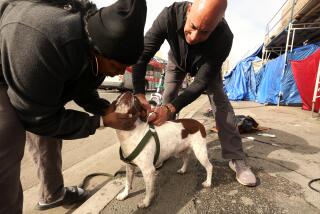Forgetting Pet’s Shots Can Be Fatal --or Lonely
- Share via
A lot of people are ignorant of the rabies-vaccination rules, and as a result their pets sometimes end up doing a stretch in solitary.
Here’s why:
Rabies is a viral disease of mammals that is spread by bites and sometimes by mere contact with an infected animal’s saliva. For people it is nearly always fatal, although it can be blocked by injections if they are given soon enough after the bite. Vaccinations of domestic animals against rabies protect not only the animals, but also people. That’s why the law is so strict.
Because cats and dogs are the animals people interact with most, and because they tend to keep other animals away, a well-vaccinated pet population forms a sort of cordon sanitaire against the rabies virus. It’s remarkably effective.
In 1977, for instance, there were only four cases of rabies in human beings in this country, according to the federal Centers for Disease Control and Prevention. (This doesn’t mean that only four people were exposed to the virus but that the combined defense of animal vaccinations and shots for exposed people works very well.) Since 1980, there have only been 36, and of those, 21 were associated with bats.
Pet owners know that vaccinations are important for an animal’s health, but they can be lax in keeping up with the shots. And that’s how they risk seeing their darling pet put in lockup.
A pet’s first vaccination is usually given by 4 months of age. Most people have no trouble with this one, because without it the pet can’t be licensed. Generally the pet will need a booster shot a year later, and then booster shots every year or every three years (depending on the vaccine the veterinarian uses) for the rest of its life.
These boosters are essential in maintaining the pet’s immunity to rabies. Nonetheless, “a lot of animals are overdue for rabies shots,” said Sandy Laden, a Bethesda, Md., veterinarian.
Overdue animals--and their owners--get into problems if they are “bitten or get into a fight or have an exposure to a potentially rabid animal,” said epidemiologist Elizabeth Barrett of Virginia’s Department of Health. This is not a hard scenario to imagine.
Suppose your dog or cat is let out, maybe only in your backyard, and it has a run-in with a raccoon. “Then, if your animal is not current, you have two options,” said Barrett. The first is to euthanize your pet, so your only real choice is this: The animal gets an injection of rabies vaccine and is put into six months’ strict isolation; it “cannot have any human or animal contact,” she said.
Strict isolation is just what it says, confirmed Clifford I. Johnson, Maryland’s public-health veterinarian. The animal is enclosed behind a double door, with one person “just opening the door and putting food in and not really handling the animal.” The owner can build a cage at home or pay to keep the animal at an approved facility.
Johnson urged hunters and anyone else who might handle wild animals to get a pre-exposure injection of rabies vaccine.
Moreover, people should not handle stray cats or animals that have been hit on the road, he said.
To keep your pets’ potential exposures harmless, keep up with their shots.
“People need to hear this,” Barrett said. “There’s too many unvaccinated cats and dogs out there.”
More to Read
Sign up for Essential California
The most important California stories and recommendations in your inbox every morning.
You may occasionally receive promotional content from the Los Angeles Times.












